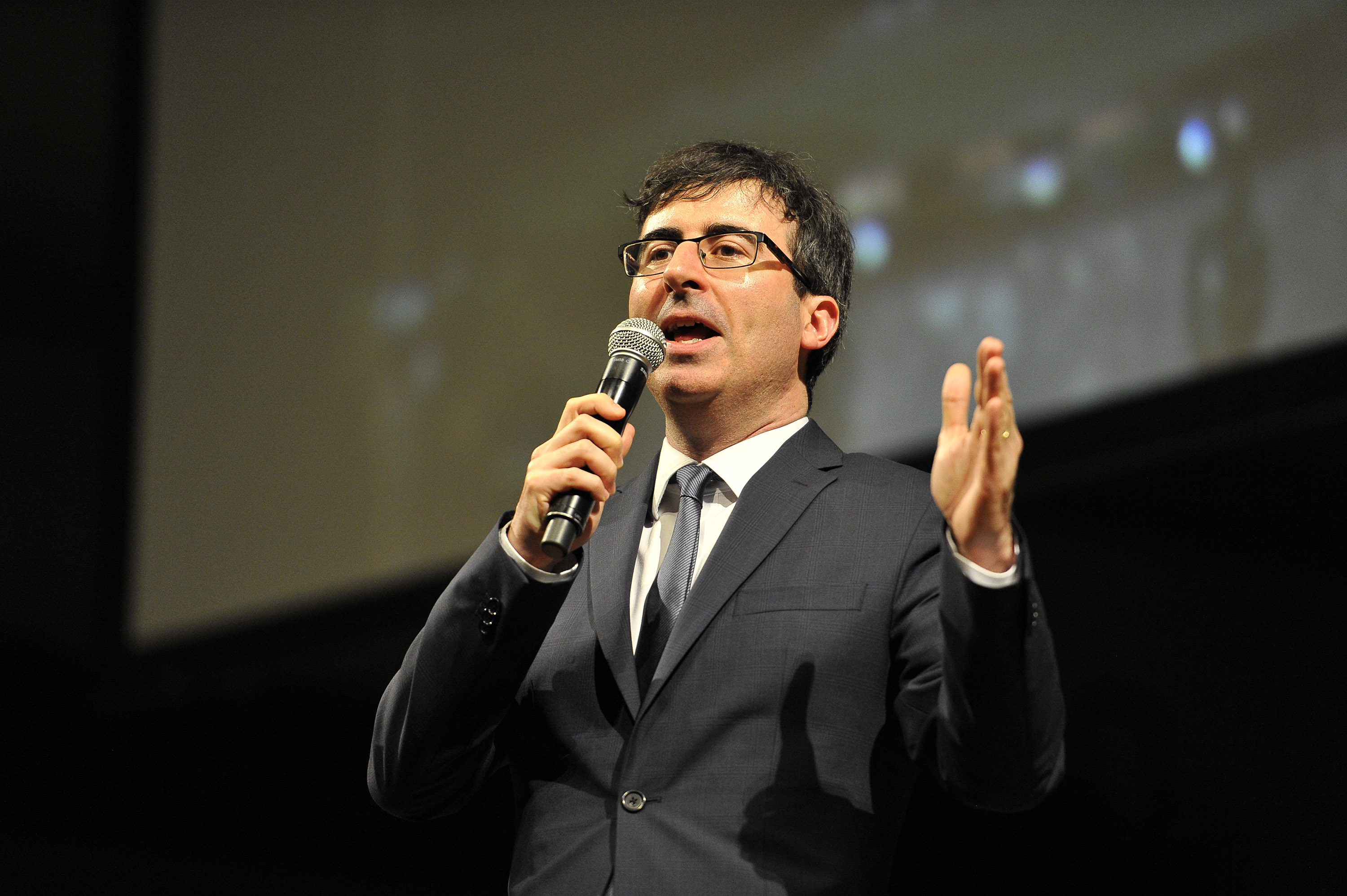John Oliver is Making American Television Great Again
 https://flic.kr/p/jYeWwU
https://flic.kr/p/jYeWwU
In March 2016, while being interviewed on The Late Show with Stephen Colbert, John Oliver said he didn’t think he’d ever have to care about Donald Trump. While most late-night shows had extensively covered Donald Trump ever since he announced his campaign for the U.S Presidency, John Oliver had barely mentioned him on his HBO show, Last Week Tonight with John Oliver. However, given Trump’s surprising success in early primary states and his endorsement by many prominent GOP leaders, Oliver decided to dedicate the main story of the week for his February 28th, 2016 show to Donald Trump.
In order to illustrate the false rhetoric used by Donald Trump and his followers to justify and advance Trump’s candidacy, Oliver decided to explore and fact-check Trump’s main selling points: his ability to “tell it like it is,” his self-funded campaign, his success as a businessman, etc. Oliver also revealed a lesser-known Trump fact: his ancestors’ last name was Drumpf. Oliver had previously explained that the name Trump was “the cornerstone of his brand”, and that it would be interesting to “un-couple that magical word from the man he really is.” He then revealed a “Make Donald Drumpf Again” hat that was modelled after Trump’s red “Make America Great Again” hats, and encouraged his viewers to download a new Chrome extension that changes mentions of ‘Donald Trump’ with ‘Donald Drumpf’. The hats sold out in a week, and the Chrome extension has been downloaded more than 433,000 times.

Despite John Oliver’s initial reluctance to cover Donald Trump, Oliver has proven to be a key voice in today’s political climate. His inclination to cover subjects in depth and to act, rather than just rant, makes him more relevant than ever.
John Oliver was born in England in 1977. He studied at Cambridge, where he joined the Cambridge Footlights comedy troupe. After university, he wrote and performed stand-up throughout England, and hosted a political radio show, ‘Political Animal’. His big break came in 2006 when he was hired as a correspondent on The Daily Show, hosted by Jon Stewart. He spent seven years on the show, and filled in for Stewart as host in the summer of 2013. Last Week Tonight debuted on HBO in April 2014, and is currently in its fourth season.
While Last Week Tonight is only thirty minutes, once a week, John Oliver still usually spends around twenty of those minutes focusing on one particular issue, which he always refers to as “our main story tonight.” Although some of those stories have focused on the Trump presidency, Oliver is not afraid to cover less frequently discussed topics. Over four seasons, he has covered charter schools, the state of journalism (even before the emergence of terms like “fake news” and “alternative facts”), net neutrality, for-profit colleges, and many other topics.
Oliver gambled when he decided to spend more than half of every episode on one particular topic. Recent research has shown that people lose concentration after only eight seconds, and that audiences are more receptive to short news stories. Consequently, broadcasters have adjusted their shows to maintain high ratings. A 2012 study by the Pew Research Centre calculated that the average story on local television lasted only 41 seconds, and that the median length of the most popular Youtube videos is just over two minutes. Therefore, it may seem most logical for Oliver to limit the length of his stories, to increase the show’s viral potential. However, Oliver disagreed:
“You have to have a pretty intense level of contempt for the American people if you think people will only watch something if it’s only two minutes long and you have someone getting smashed in the nuts at some point. And I’m not saying I don’t enjoy two-minute-long, nut-smashing videos, but there has to be more. There has to be protein along with dessert. Although I was pretty surprised by the extent to which people have wanted to watch long pieces about things that seem objectively boring, like net neutrality, or objectively distressing, like the Iraqi and Afghan translators.”
Oliver’s dedication to long pieces isn’t due to the Trump presidency — he started doing them more than two years before the 2016 election. However, there is something refreshing in the era of ‘fake news’ about a long, in-depth commentary on a lesser known issue. While there is evidence of a liberal bias to Oliver’s analysis, he aims to present people with all of the facts. He doesn’t cherry pick his information – and doesn’t have to, given the length of his pieces. Instead, Oliver takes the time to elaborate on complex and sometimes obscure issues
John Oliver’s faith in the public’s ability to digest longer stories has paid off, with some of his longer pieces generating real change. For example, after he did a piece on bail requirements and how bail was used to keep poor defendants in jail, New York City Mayor Bill de Blasio announced that the city would ”relax bail requirements for people charged with nonviolent crimes and misdemeanors.” During his piece on net neutrality, Oliver encouraged voters to write to the Federal Communication Commission (FCC) to express their worries with potential changes with net neutrality regulations. The FCC website received so many emails that it crashed. Although the fight to maintain net neutrality ultimately failed, Oliver’s discussion of the subject mobilized Americans who may otherwise not have participated in the political process.
Oliver is also willing to act, rather than just talk, in order to illustrate many of his points. Earlier this year, he dedicated his main story to Vice President Mike Pence, discussing Pence’s questionable record on LGBTQ rights. When the episode aired, Pence’s wife and daughter were about to release a children’s book on the family’s pet rabbit, titled Marlon Bundo’s A Day in the Life of the Vice President. Oliver then announced that Last Week Tonight had produced its own Marlon Bundo book: A Day in the Life of Marlon Bundo. There was one twist, however: Oliver’s Marlon Bundo was a gay bunny, and the profits from the book would be donated to the Trevor Project (a confidential suicide hotline for LGBTQ youth) and AIDS United. The parody version soon became a hit: it reached No.1 on Amazon, and sold out within two days. Furthermore, Will & Grace showrunner Max Mutchnick announced that he had bought a copy of the book for each elementary school in Indiana, Pence’s home state.
Another of Oliver’s stunts came when he devoted a long segment to mega-churches and televangelists (whom Oliver believes “exploit people’s faith for monetary gain”) in the United States. After arguing that it was very easy to become a tax-exempt religious organization, Oliver and his staff actually set up their own church, Our Lady of Perpetual Exemption.

John Oliver’s stunts are more than just viral moments. By taking action to raise awareness to an issue, or to help a marginalized group, he shows that ranting isn’t enough to create change. Instead of just complaining about Mike Pence’s treatment of the LGBTQ community, he wrote a book to support that community. He didn’t just rant about how easy megachurches have it; he created his own church to illustrate how absurd the rules are. In an era where the president frequently embarks on Twitter tirades to protest about policies, it is equally appropriate for public personalities to make use of various forms of media in order to prompt change.
It is important to acknowledge John Oliver’s privilege, compared to other late night hosts and news anchors. Since Last Week Tonight airs on HBO, there are no ads during the show. Therefore, he can spend twenty or thirty minutes on a topic without having to go to commercial break – something most hosts can’t do. Furthermore, he only has to prepare one show a week, and HBO’s budget allows Oliver to pull off impressive stunts (he once bought more than $14 million in medical debt from 9,000 people).
John Oliver is not the only late night host who seems to have found even more relevance in the Trump era. Stephen Colbert, host of The Late Night Show (and a former Daily Show correspondent like Oliver), has had increasingly political monologues. Since Trump’s election, Colbert’s ratings have gone up by 23 percent. Jimmy Kimmel, host of Jimmy Kimmel Live!, has made healthcare a recurrent topic of discussion on his show. Samantha Bee (another Daily Show alum), host of Full Frontal, had her own version of the White House Correspondents’ Dinner, in a special called Not the White House Correspondents’ Dinner. Seth Meyers, of The Late Show, devotes more time to political commentary with his ‘Closer Look’ segments. The only late night host who doesn’t seem to know where to fit in the Trump era is Jimmy Fallon, of The Tonight Show. Fallon has avoided political commentary during Trump’s first year in office, and his ratings have fallen by 21 percent.
Of course, it is Fallon’s prerogative to ignore the political discussion and focus on entertainment. However, many viewers are starting to seek more than just jokes from their late-night hosts in this volatile political climate.
John Oliver has always insisted that he is not a journalist, but rather a comedian. No matter the label used, he is more relevant now than ever. He has made great use of his platform to counter the emergence of fake news and clickbaiting. He is not afraid to educate his viewers on obscure topics, and to take action to make a point. Last September, Last Week Tonight was renewed by HBO through 2020. With Trump’s presidency also set to continue until at least 2020, Oliver’s show is likely to remain as pertinent into the future as it is now.
Edited by Catharina O’Donnell.
